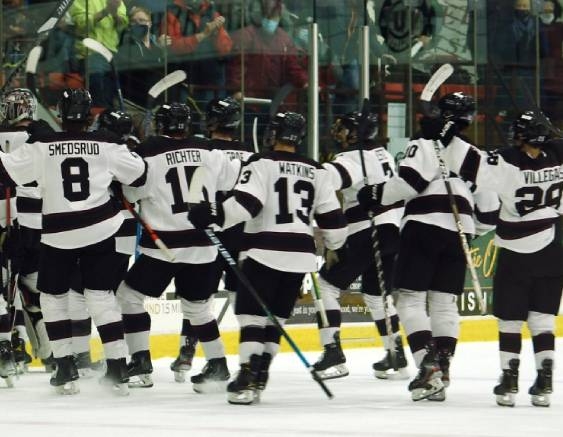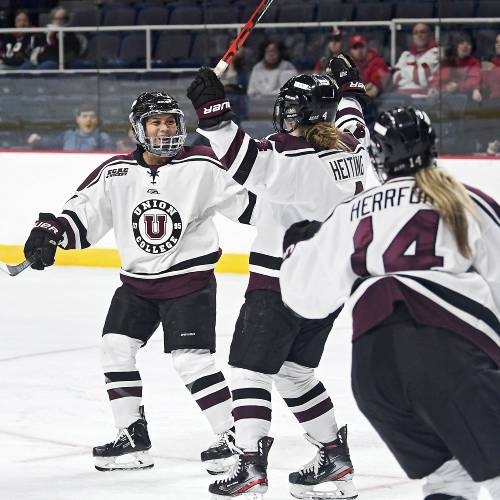The NCAA Division III membership Saturday voted to allow all multi-divisional institutions to apply Division I rules to their Division I programs, including financial aid. This change will allow Union to offer athletic scholarships for its Division I men’s and women’s ice hockey teams for the first time.
The long-awaited decision by the membership came during the NCAA’s annual meeting in Indianapolis. The vote was 388-18, with 39 abstentions.
The ability to offer scholarships is arguably the most pivotal moment in the history of ice hockey at Union since the decision in 1991 for the men’s team to jump from Division III to Division I. The women’s program followed in 2003.
“We are gratified that the NCAA membership approved this measure, which puts Union College and institutions in similar situations on a level playing field with their Division I colleagues,” said President David R. Harris. “For Union, being able to offer scholarships will greatly enhance our ability to compete at the highest level in men’s and women's hockey, and to build on our proud history on the ice.
“Even more importantly, it provides another powerful tool that we can use to attract exceptional people to Union who are also outstanding students and athletes.”
Union and the Rochester Institute of Technology were the only schools of the 59 competing in Division I hockey that were not allowed to offer scholarships under long-ago legislation. Both schools petitioned the NCAA for a waiver that would allow them to offer scholarships.
For years, the multi-divisional schools (which play Division I men and women’s ice hockey but compete in Division III in all other sports) were able to be competitive without the benefit of scholarships. However, the shifting dynamics in college sports has upended the competitive landscape.
One of the biggest changes came last spring, when the NCAA loosened its transfer rules, allowing all college athletes to transfer one time without having to sit out a season. The exception to transfer from one Division I school to another had been available to athletes in other college sports for years, but the change meant it now applied to football, men’s and women’s basketball, men’s ice hockey and baseball.
The policy instantly put Union at a distinct disadvantage. Union’s hockey programs pride themselves on an ability to fill their rosters with solid players who are also exceptional students during their four years. Under the new transfer rules, however, student-athletes can begin their career at Union, getting valuable game experience before entering the transfer portal and becoming eligible to play the following season for a school that offers scholarships.
The petition had the support of all NCAA Division I member conferences that sponsor men’s and women’s ice hockey, along with the American Hockey Coaches Association, Hockey Commissioners Association and Liberty League. The groups argued that the waiver protects the competitive spirit of the sport and abides by one of the association’s core tenets outlined in the NCAA’s Principle for Competitive Equity.
Supporters also pointed to the recent Supreme Court decision in Alston v. NCAA, which unanimously ruled that the NCAA could not restrict educational-related benefits, including athletic scholarships and the cost of attendance.
“We are simply looking to provide the opportunities to our student-athletes and programs consistent with the Division I hockey landscape,” said Director of Athletics Jim McLaughlin ’93.
Currently, 10 NCAA schools compete primarily in Division III but also offer sports at the Division I level. Of those, five offer scholarships, including four with hockey programs: Clarkson University, Colorado College, Rensselaer Polytechnic Institute and St. Lawrence University. The other multi-divisional institution that offers scholarships is Johns Hopkins University, for men’s and women’s lacrosse.
Saturday’s vote means the five prohibited from offering scholarships at the Division I level can now join the other schools if they choose. Besides Union and RIT for hockey, the other schools are Franklin and Marshall (men’s wrestling), Hobart and William Smith College (men’s lacrosse) and Massachusetts Institute of Technology (women’s crew).
College officials emphasize that providing scholarships will not curtail other campus priorities. To offset the costs of the scholarships, a campaign to establish an endowment from Union’s energized base of hockey donors will provide the additional funding needed in perpetuity for the increased costs from the current need-based aid allocation available to all students.

